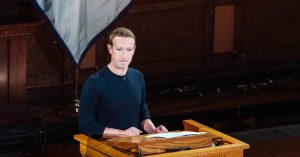Ben Horowitz, cofounder of the venture firm Andreessen Horowitz, thinks that the best way to convey to executives the importance of new employee orientation is through a story about a brutal prison murder.
At the WIRED25 Festival in San Francisco on Friday, Horowitz said that when it comes to explaining these concepts to CEOs, the straightforward approach doesn’t work. If he simply told them that new employee orientation programs were valuable and worth emphasizing, they would blow him off, he said.
“Shaka Senghor, first day in prison,” Horowitz continued, referring to the now best-selling author who served 19 years for a 1991 murder. “He comes out of quarantine, goes into the rec area. A prisoner walks up to another prisoner, stabs them in the neck. Guy bleeds out, dies. Guy throws the shank in the trash, goes to the chow hall and has a sandwich.”
Horowitz recalled Senghor telling him that watching this gory scene unfold made Senghor wonder whether he would be able to kill one of his fellow inmates in the same way. “But I knew that I had to ask myself: Could I do that to survive? Because that’s what it took to survive here,” Horowitz recalled Senghor saying.
“So you see how his culture gets changed on new employee orientation,” said Horowitz. “People walk into your company and they go [how do] you succeed in here? This happens every single day.”
If a new employee sees “a guy [who’s] got a big job” take credit for another employee’s work and get rewarded for it, that will influence their understanding of what success looks like at their new workplace, he explained. Horowitz told WIRED editor at large Steven Levy that he uses “the violence” to make points like these clear.
Shaka Senghor, who Horowtiz describes as a formidable prison gang boss, is but one of four people that he considers to be exemplary models of leadership and culture building. Horowitz said three other figures were “very influential” on his thinking: Genghis Khan, the Mongol conquerer infamous for slaughtering tens of millions of people; Toussaint L’Ouverture, leader of Haiti’s successful slave revolt; and “the Samurai” of Japan generally, who he said he admires for their culture and how they treat death.
Horowitz said that what he found so instructive about Senghor’s story was that, “in Silicon Valley, you can take culture for granted because people come with a lot of cultural elements, starting with they know how to show up on time for an interview,” he explained. “In prison, like, you don’t have a big basis, so you really have to start from the first principles when you’re talking about building an organization that can be effective and keep each other safe.”
When asked by Levy how the Haitian slave revolt and Genghis Khan have helped him in his business endeavors, Horowitz cited Uber as an example.
“[Uber] ran into some issues with the culture, but people wrote it up as ‘Uber has got this out-of-control, toxic [culture], but it was a very in-control, highly designed culture that they trained on really effectively,” he said. “It was really well designed, really well executed, but it was missing this one little piece, which is, with ethics, if you don’t make them explicit and have a strong reason behind them and make them really specific, then the business incentive will just run over the kind of ethical rail.”
- Livestream: Watch the future unfold here
- Essay: It’s time to push tech forward, and rebuild what it broke
- November Issue: Stories of people who are racing to save us
- Summit+Culture & Fam: Full event details
- Want more WIRED? Subscribe now



